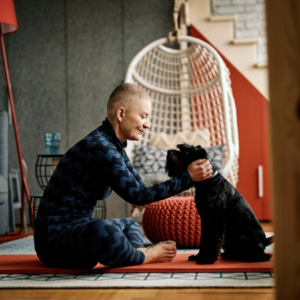Canine Company: Why You May Want A Dog in 2024

Canine Company: Why You May Want A Dog in 2024
January 3, 2024
It’s no secret that among older adults, loneliness and dementia are ongoing and growing problems. Add to that the rise in older adults living alone and you have the makings of a real public health crisis as our population continues to get older. While there are all sorts of scientific advances in the works to slow down the progress of dementia, currently we have little in our arsenal to prevent or even cure a dementia diagnosis. But when it comes to dementia, loneliness, and solo living, we now have a new study that suggests something that may help: that is, the companionship of a pet.
In a new study published in JAMA Network Open, researchers report an association between owning a pet and having a slower rate of cognitive decline among those living alone, compared to those who live alone and have no pets (and saw no slowdown of cognitive decline). Living alone may trigger social isolation and bouts of loneliness, which we know is a risk factor for dementia. This new study seems to suggest that pet ownership may offset the decline in cognition that can accompany living alone and loneliness. For more on this study, cuddle with your pet and read here. Another study published earlier last fall found a similar association between pet owners and slower rates of cognitive decline, this time not limited to owners who lived alone.
There is a lot of existing evidence that pet ownership- particularly dog ownership- can be a real boost to both physical and mental health among older adults. A new book about this connection between humans and dogs- entitled The Purest Bond: Understanding the Human–Canine Connection– was recently published and author Jen Golbeck was interviewed in Axios about the research behind this connection. Whether bonding with your dog or getting yourself outside for a walk, dog ownership appears to boost mental and physical health. One study even found that a dog owner’s risk of dying from heart disease was 31% less than a non-dog owner, likely due to the physical movement necessary for caring for a dog, along with stress reduction and more upbeat moods.
If you are not already a dog owner, does it make sense to go out and get one? While there are health advantages to owning a dog, there are also serious responsibilities that may or may not be viable for older adults. Dogs come with expenses (food, grooming, vet bills), require that you engage in physical activity such as walking, and cannot be left alone if you want to pursue retirement travel or just be away from home for an extended period. It is even possible that breeders or shelters may be reluctant to allow older adults to take home a new dog if there are concerns about taking on these responsibilities. Given these factors, a recent list of the “best dog breeds for seniors” included dogs that require modest grooming and limited physical activity yet have loving personalities. The top dog recommendation? The Shi Tzu. And for those of you who are partial to cats, there’s also a list of the best cat breeds for seniors.
But if, for whatever reason, you cannot bring a dog into your life, rest assured you can still benefit from being in the presence of a dog. A recent post on NPR cited research that even petting dogs belonging to others can be a health boost for you. So bend over and pet (with permission) the next friendly dog you meet when you’re out and about, and read more here.







